Business Environment Essay: FDI, MNC Influence, and Policies
VerifiedAdded on 2022/08/26
|10
|2792
|19
Essay
AI Summary
This essay critically examines the assertion that Foreign Direct Investment (FDI) allows Multinational Corporations (MNCs) to dictate economic policies to host governments. It explores the benefits of FDI, such as employment growth and improved living standards, while also discussing the potential for MNCs to influence government policies through incentives like tax reductions. The essay analyzes case studies, including the impact of MNCs in Sub-Saharan Africa, the UK employment sector, and the oil industry in the Middle East, highlighting both the advantages and disadvantages of FDI. It discusses the roles of economic liberalization, political support, and nationalism in shaping FDI and MNC influence, as well as the impact of competition and government regulations. The paper concludes by evaluating the extent to which MNCs can dictate policies, considering factors like government strength, nationalism, and financial stability.
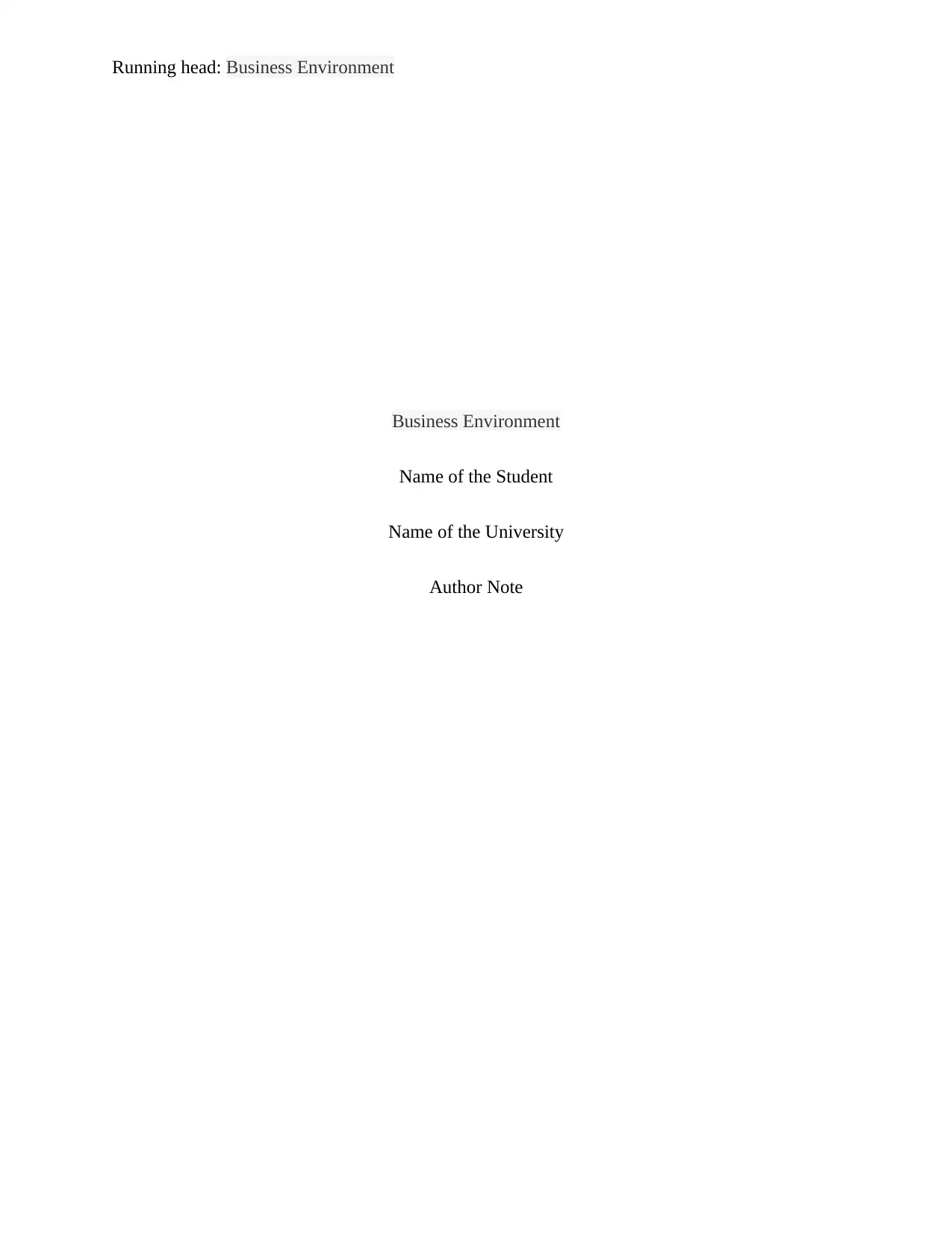
Running head: Business Environment
Business Environment
Name of the Student
Name of the University
Author Note
Business Environment
Name of the Student
Name of the University
Author Note
Paraphrase This Document
Need a fresh take? Get an instant paraphrase of this document with our AI Paraphraser
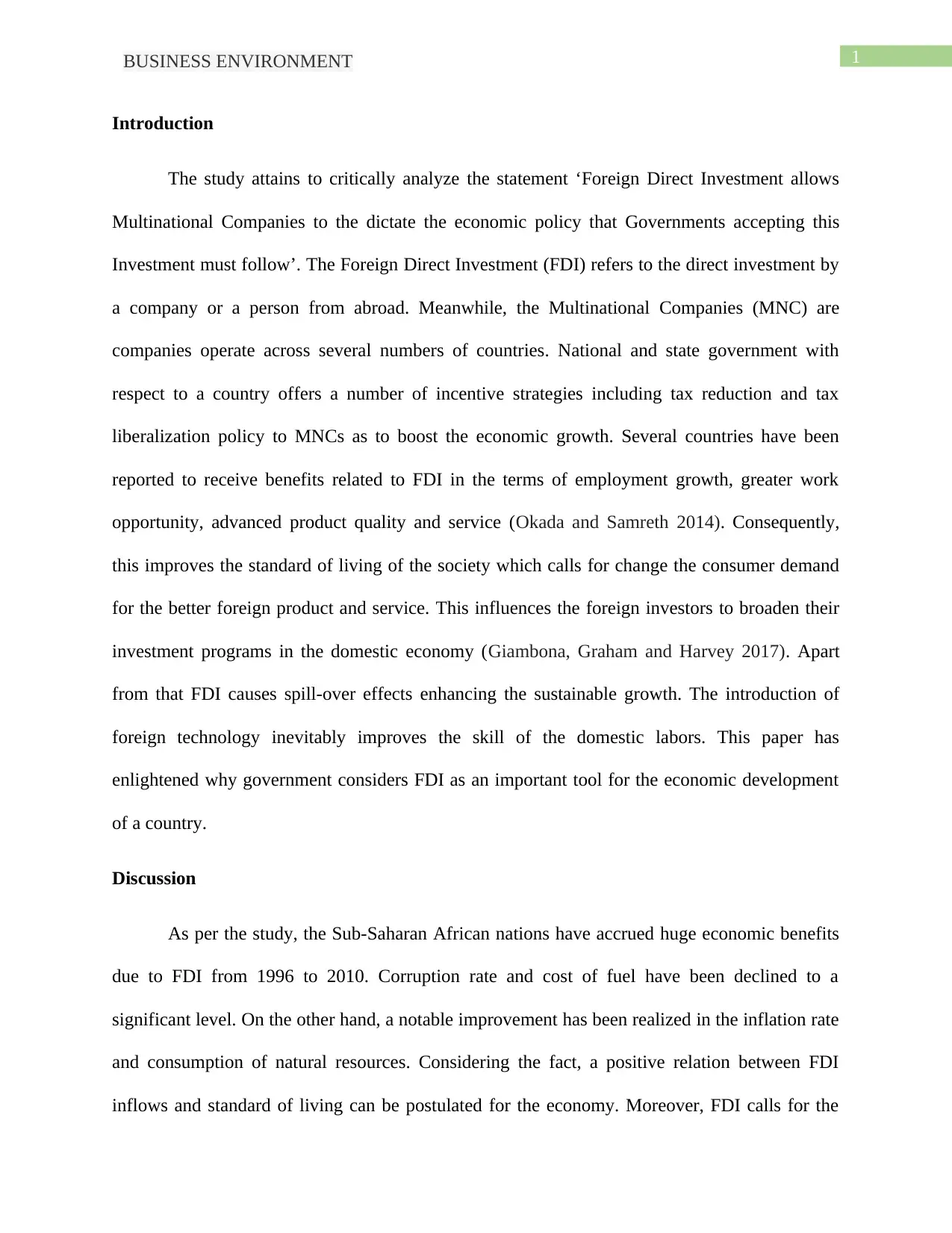
1BUSINESS ENVIRONMENT
Introduction
The study attains to critically analyze the statement ‘Foreign Direct Investment allows
Multinational Companies to the dictate the economic policy that Governments accepting this
Investment must follow’. The Foreign Direct Investment (FDI) refers to the direct investment by
a company or a person from abroad. Meanwhile, the Multinational Companies (MNC) are
companies operate across several numbers of countries. National and state government with
respect to a country offers a number of incentive strategies including tax reduction and tax
liberalization policy to MNCs as to boost the economic growth. Several countries have been
reported to receive benefits related to FDI in the terms of employment growth, greater work
opportunity, advanced product quality and service (Okada and Samreth 2014). Consequently,
this improves the standard of living of the society which calls for change the consumer demand
for the better foreign product and service. This influences the foreign investors to broaden their
investment programs in the domestic economy (Giambona, Graham and Harvey 2017). Apart
from that FDI causes spill-over effects enhancing the sustainable growth. The introduction of
foreign technology inevitably improves the skill of the domestic labors. This paper has
enlightened why government considers FDI as an important tool for the economic development
of a country.
Discussion
As per the study, the Sub-Saharan African nations have accrued huge economic benefits
due to FDI from 1996 to 2010. Corruption rate and cost of fuel have been declined to a
significant level. On the other hand, a notable improvement has been realized in the inflation rate
and consumption of natural resources. Considering the fact, a positive relation between FDI
inflows and standard of living can be postulated for the economy. Moreover, FDI calls for the
Introduction
The study attains to critically analyze the statement ‘Foreign Direct Investment allows
Multinational Companies to the dictate the economic policy that Governments accepting this
Investment must follow’. The Foreign Direct Investment (FDI) refers to the direct investment by
a company or a person from abroad. Meanwhile, the Multinational Companies (MNC) are
companies operate across several numbers of countries. National and state government with
respect to a country offers a number of incentive strategies including tax reduction and tax
liberalization policy to MNCs as to boost the economic growth. Several countries have been
reported to receive benefits related to FDI in the terms of employment growth, greater work
opportunity, advanced product quality and service (Okada and Samreth 2014). Consequently,
this improves the standard of living of the society which calls for change the consumer demand
for the better foreign product and service. This influences the foreign investors to broaden their
investment programs in the domestic economy (Giambona, Graham and Harvey 2017). Apart
from that FDI causes spill-over effects enhancing the sustainable growth. The introduction of
foreign technology inevitably improves the skill of the domestic labors. This paper has
enlightened why government considers FDI as an important tool for the economic development
of a country.
Discussion
As per the study, the Sub-Saharan African nations have accrued huge economic benefits
due to FDI from 1996 to 2010. Corruption rate and cost of fuel have been declined to a
significant level. On the other hand, a notable improvement has been realized in the inflation rate
and consumption of natural resources. Considering the fact, a positive relation between FDI
inflows and standard of living can be postulated for the economy. Moreover, FDI calls for the
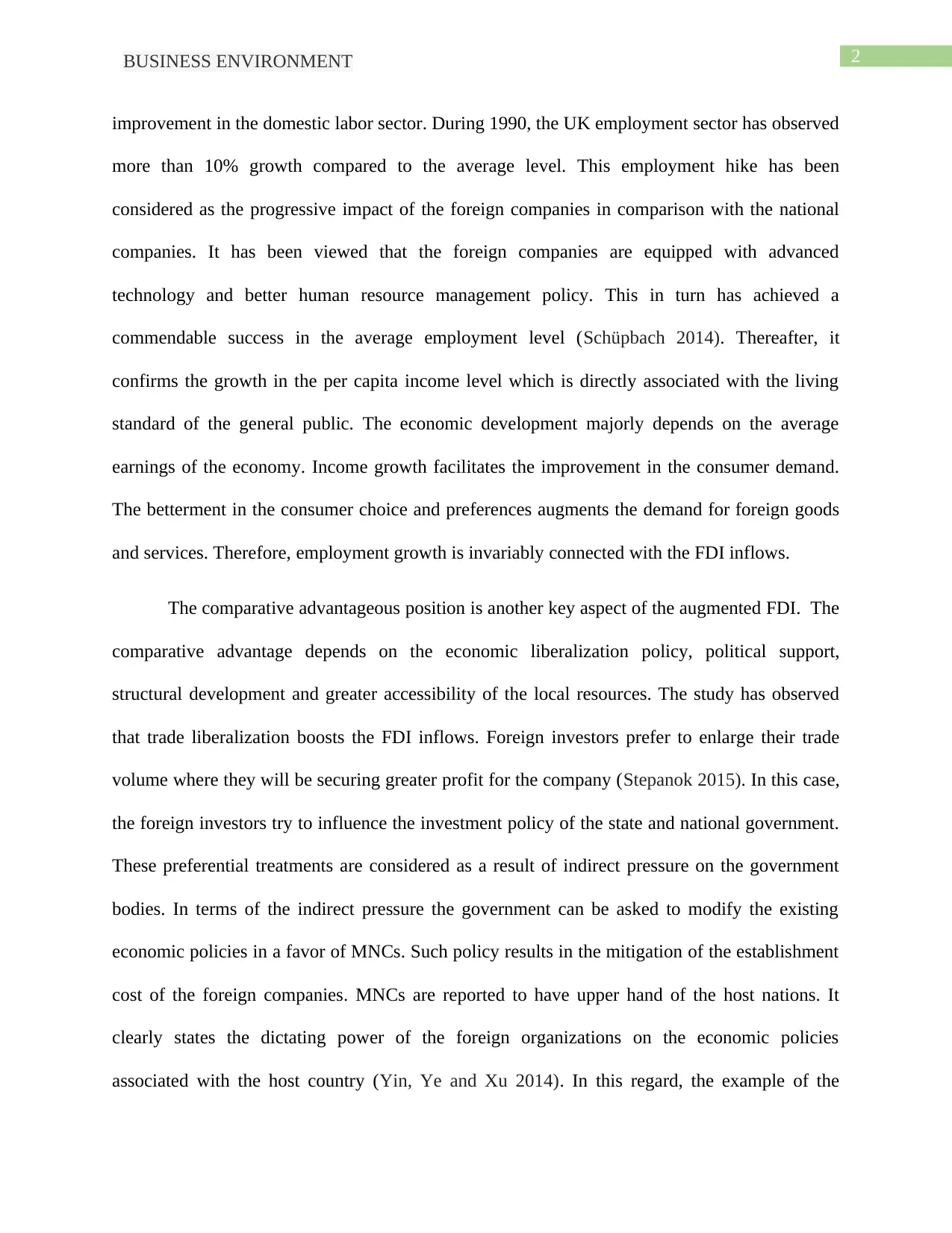
2BUSINESS ENVIRONMENT
improvement in the domestic labor sector. During 1990, the UK employment sector has observed
more than 10% growth compared to the average level. This employment hike has been
considered as the progressive impact of the foreign companies in comparison with the national
companies. It has been viewed that the foreign companies are equipped with advanced
technology and better human resource management policy. This in turn has achieved a
commendable success in the average employment level (Schüpbach 2014). Thereafter, it
confirms the growth in the per capita income level which is directly associated with the living
standard of the general public. The economic development majorly depends on the average
earnings of the economy. Income growth facilitates the improvement in the consumer demand.
The betterment in the consumer choice and preferences augments the demand for foreign goods
and services. Therefore, employment growth is invariably connected with the FDI inflows.
The comparative advantageous position is another key aspect of the augmented FDI. The
comparative advantage depends on the economic liberalization policy, political support,
structural development and greater accessibility of the local resources. The study has observed
that trade liberalization boosts the FDI inflows. Foreign investors prefer to enlarge their trade
volume where they will be securing greater profit for the company (Stepanok 2015). In this case,
the foreign investors try to influence the investment policy of the state and national government.
These preferential treatments are considered as a result of indirect pressure on the government
bodies. In terms of the indirect pressure the government can be asked to modify the existing
economic policies in a favor of MNCs. Such policy results in the mitigation of the establishment
cost of the foreign companies. MNCs are reported to have upper hand of the host nations. It
clearly states the dictating power of the foreign organizations on the economic policies
associated with the host country (Yin, Ye and Xu 2014). In this regard, the example of the
improvement in the domestic labor sector. During 1990, the UK employment sector has observed
more than 10% growth compared to the average level. This employment hike has been
considered as the progressive impact of the foreign companies in comparison with the national
companies. It has been viewed that the foreign companies are equipped with advanced
technology and better human resource management policy. This in turn has achieved a
commendable success in the average employment level (Schüpbach 2014). Thereafter, it
confirms the growth in the per capita income level which is directly associated with the living
standard of the general public. The economic development majorly depends on the average
earnings of the economy. Income growth facilitates the improvement in the consumer demand.
The betterment in the consumer choice and preferences augments the demand for foreign goods
and services. Therefore, employment growth is invariably connected with the FDI inflows.
The comparative advantageous position is another key aspect of the augmented FDI. The
comparative advantage depends on the economic liberalization policy, political support,
structural development and greater accessibility of the local resources. The study has observed
that trade liberalization boosts the FDI inflows. Foreign investors prefer to enlarge their trade
volume where they will be securing greater profit for the company (Stepanok 2015). In this case,
the foreign investors try to influence the investment policy of the state and national government.
These preferential treatments are considered as a result of indirect pressure on the government
bodies. In terms of the indirect pressure the government can be asked to modify the existing
economic policies in a favor of MNCs. Such policy results in the mitigation of the establishment
cost of the foreign companies. MNCs are reported to have upper hand of the host nations. It
clearly states the dictating power of the foreign organizations on the economic policies
associated with the host country (Yin, Ye and Xu 2014). In this regard, the example of the
⊘ This is a preview!⊘
Do you want full access?
Subscribe today to unlock all pages.

Trusted by 1+ million students worldwide
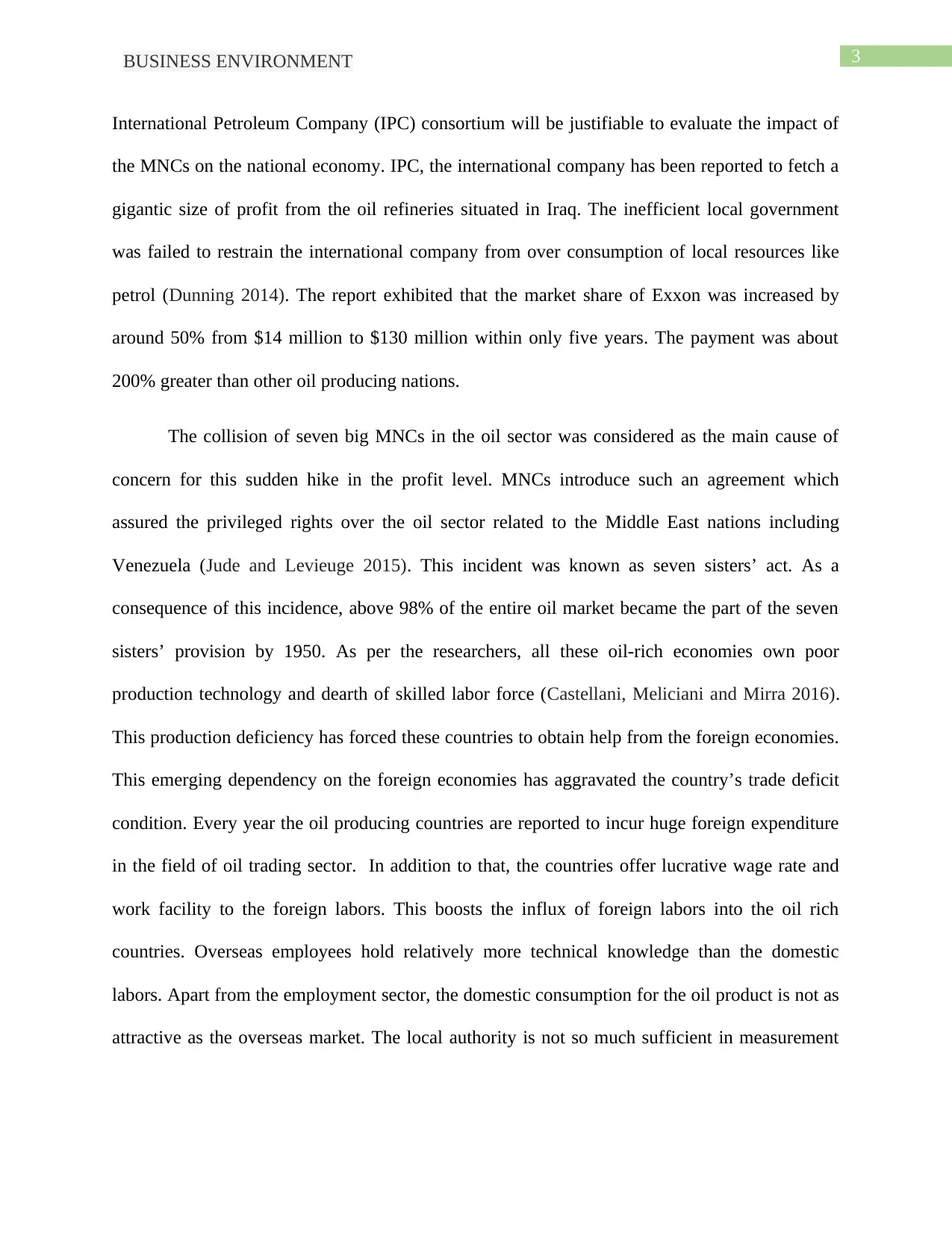
3BUSINESS ENVIRONMENT
International Petroleum Company (IPC) consortium will be justifiable to evaluate the impact of
the MNCs on the national economy. IPC, the international company has been reported to fetch a
gigantic size of profit from the oil refineries situated in Iraq. The inefficient local government
was failed to restrain the international company from over consumption of local resources like
petrol (Dunning 2014). The report exhibited that the market share of Exxon was increased by
around 50% from $14 million to $130 million within only five years. The payment was about
200% greater than other oil producing nations.
The collision of seven big MNCs in the oil sector was considered as the main cause of
concern for this sudden hike in the profit level. MNCs introduce such an agreement which
assured the privileged rights over the oil sector related to the Middle East nations including
Venezuela (Jude and Levieuge 2015). This incident was known as seven sisters’ act. As a
consequence of this incidence, above 98% of the entire oil market became the part of the seven
sisters’ provision by 1950. As per the researchers, all these oil-rich economies own poor
production technology and dearth of skilled labor force (Castellani, Meliciani and Mirra 2016).
This production deficiency has forced these countries to obtain help from the foreign economies.
This emerging dependency on the foreign economies has aggravated the country’s trade deficit
condition. Every year the oil producing countries are reported to incur huge foreign expenditure
in the field of oil trading sector. In addition to that, the countries offer lucrative wage rate and
work facility to the foreign labors. This boosts the influx of foreign labors into the oil rich
countries. Overseas employees hold relatively more technical knowledge than the domestic
labors. Apart from the employment sector, the domestic consumption for the oil product is not as
attractive as the overseas market. The local authority is not so much sufficient in measurement
International Petroleum Company (IPC) consortium will be justifiable to evaluate the impact of
the MNCs on the national economy. IPC, the international company has been reported to fetch a
gigantic size of profit from the oil refineries situated in Iraq. The inefficient local government
was failed to restrain the international company from over consumption of local resources like
petrol (Dunning 2014). The report exhibited that the market share of Exxon was increased by
around 50% from $14 million to $130 million within only five years. The payment was about
200% greater than other oil producing nations.
The collision of seven big MNCs in the oil sector was considered as the main cause of
concern for this sudden hike in the profit level. MNCs introduce such an agreement which
assured the privileged rights over the oil sector related to the Middle East nations including
Venezuela (Jude and Levieuge 2015). This incident was known as seven sisters’ act. As a
consequence of this incidence, above 98% of the entire oil market became the part of the seven
sisters’ provision by 1950. As per the researchers, all these oil-rich economies own poor
production technology and dearth of skilled labor force (Castellani, Meliciani and Mirra 2016).
This production deficiency has forced these countries to obtain help from the foreign economies.
This emerging dependency on the foreign economies has aggravated the country’s trade deficit
condition. Every year the oil producing countries are reported to incur huge foreign expenditure
in the field of oil trading sector. In addition to that, the countries offer lucrative wage rate and
work facility to the foreign labors. This boosts the influx of foreign labors into the oil rich
countries. Overseas employees hold relatively more technical knowledge than the domestic
labors. Apart from the employment sector, the domestic consumption for the oil product is not as
attractive as the overseas market. The local authority is not so much sufficient in measurement
Paraphrase This Document
Need a fresh take? Get an instant paraphrase of this document with our AI Paraphraser
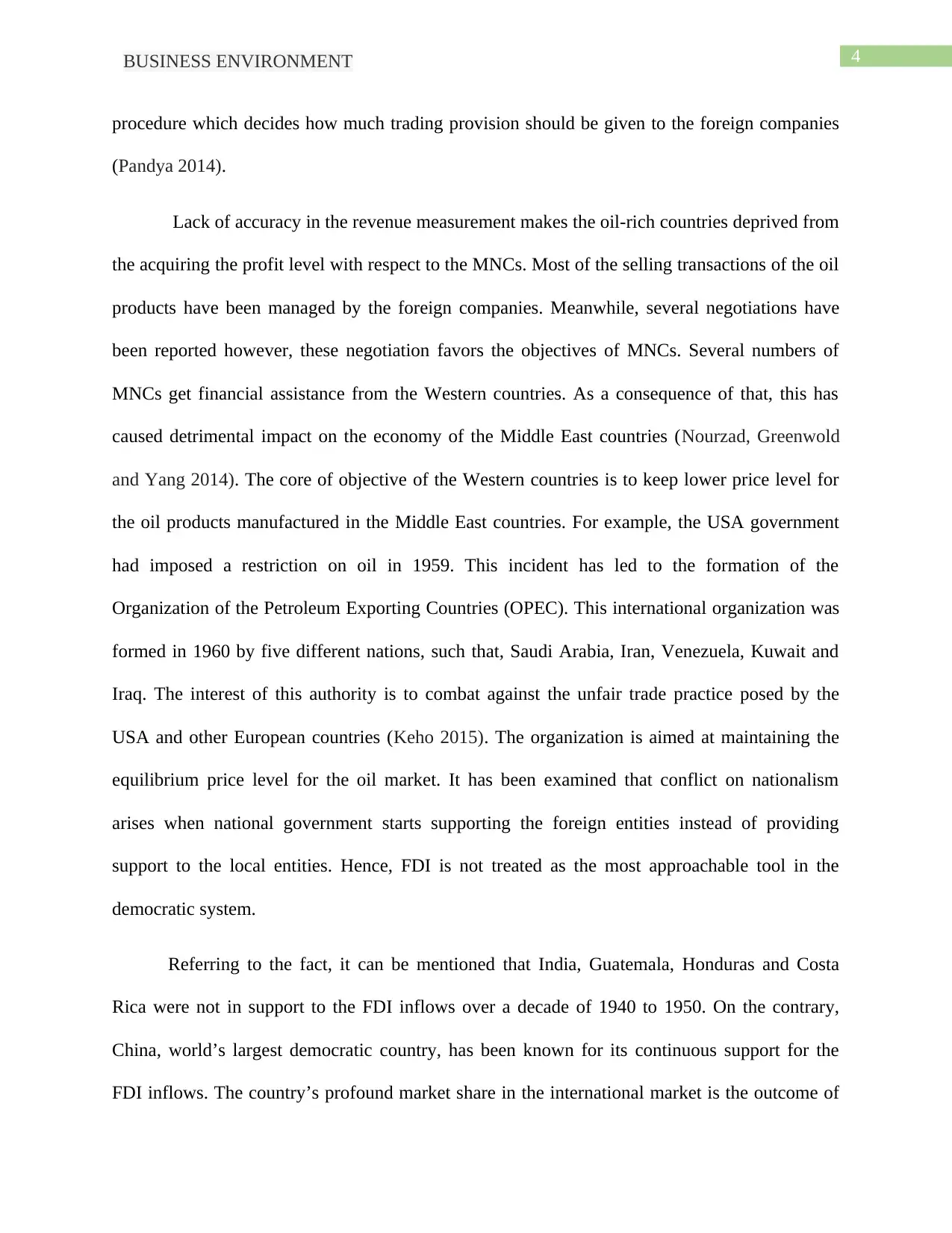
4BUSINESS ENVIRONMENT
procedure which decides how much trading provision should be given to the foreign companies
(Pandya 2014).
Lack of accuracy in the revenue measurement makes the oil-rich countries deprived from
the acquiring the profit level with respect to the MNCs. Most of the selling transactions of the oil
products have been managed by the foreign companies. Meanwhile, several negotiations have
been reported however, these negotiation favors the objectives of MNCs. Several numbers of
MNCs get financial assistance from the Western countries. As a consequence of that, this has
caused detrimental impact on the economy of the Middle East countries (Nourzad, Greenwold
and Yang 2014). The core of objective of the Western countries is to keep lower price level for
the oil products manufactured in the Middle East countries. For example, the USA government
had imposed a restriction on oil in 1959. This incident has led to the formation of the
Organization of the Petroleum Exporting Countries (OPEC). This international organization was
formed in 1960 by five different nations, such that, Saudi Arabia, Iran, Venezuela, Kuwait and
Iraq. The interest of this authority is to combat against the unfair trade practice posed by the
USA and other European countries (Keho 2015). The organization is aimed at maintaining the
equilibrium price level for the oil market. It has been examined that conflict on nationalism
arises when national government starts supporting the foreign entities instead of providing
support to the local entities. Hence, FDI is not treated as the most approachable tool in the
democratic system.
Referring to the fact, it can be mentioned that India, Guatemala, Honduras and Costa
Rica were not in support to the FDI inflows over a decade of 1940 to 1950. On the contrary,
China, world’s largest democratic country, has been known for its continuous support for the
FDI inflows. The country’s profound market share in the international market is the outcome of
procedure which decides how much trading provision should be given to the foreign companies
(Pandya 2014).
Lack of accuracy in the revenue measurement makes the oil-rich countries deprived from
the acquiring the profit level with respect to the MNCs. Most of the selling transactions of the oil
products have been managed by the foreign companies. Meanwhile, several negotiations have
been reported however, these negotiation favors the objectives of MNCs. Several numbers of
MNCs get financial assistance from the Western countries. As a consequence of that, this has
caused detrimental impact on the economy of the Middle East countries (Nourzad, Greenwold
and Yang 2014). The core of objective of the Western countries is to keep lower price level for
the oil products manufactured in the Middle East countries. For example, the USA government
had imposed a restriction on oil in 1959. This incident has led to the formation of the
Organization of the Petroleum Exporting Countries (OPEC). This international organization was
formed in 1960 by five different nations, such that, Saudi Arabia, Iran, Venezuela, Kuwait and
Iraq. The interest of this authority is to combat against the unfair trade practice posed by the
USA and other European countries (Keho 2015). The organization is aimed at maintaining the
equilibrium price level for the oil market. It has been examined that conflict on nationalism
arises when national government starts supporting the foreign entities instead of providing
support to the local entities. Hence, FDI is not treated as the most approachable tool in the
democratic system.
Referring to the fact, it can be mentioned that India, Guatemala, Honduras and Costa
Rica were not in support to the FDI inflows over a decade of 1940 to 1950. On the contrary,
China, world’s largest democratic country, has been known for its continuous support for the
FDI inflows. The country’s profound market share in the international market is the outcome of
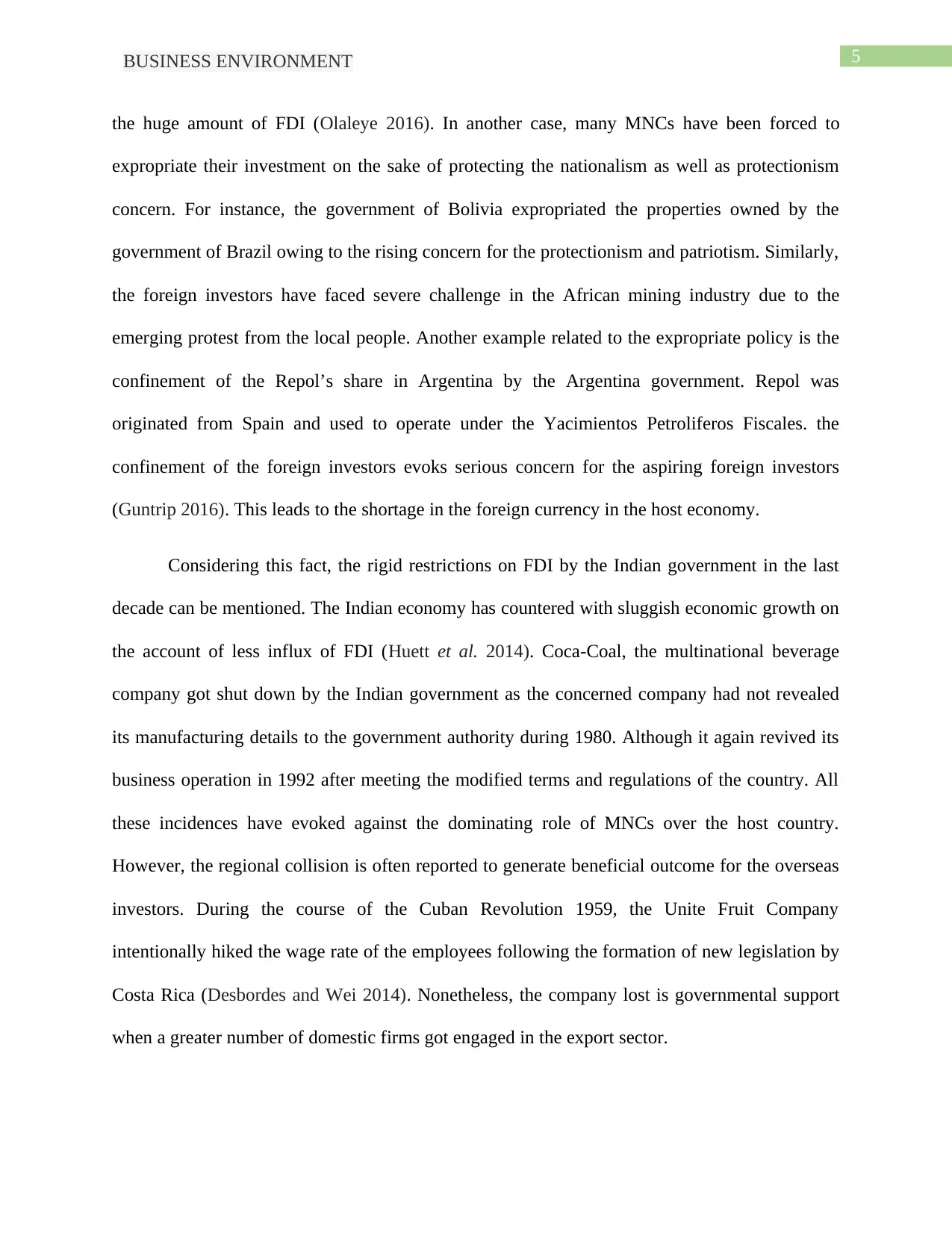
5BUSINESS ENVIRONMENT
the huge amount of FDI (Olaleye 2016). In another case, many MNCs have been forced to
expropriate their investment on the sake of protecting the nationalism as well as protectionism
concern. For instance, the government of Bolivia expropriated the properties owned by the
government of Brazil owing to the rising concern for the protectionism and patriotism. Similarly,
the foreign investors have faced severe challenge in the African mining industry due to the
emerging protest from the local people. Another example related to the expropriate policy is the
confinement of the Repol’s share in Argentina by the Argentina government. Repol was
originated from Spain and used to operate under the Yacimientos Petroliferos Fiscales. the
confinement of the foreign investors evoks serious concern for the aspiring foreign investors
(Guntrip 2016). This leads to the shortage in the foreign currency in the host economy.
Considering this fact, the rigid restrictions on FDI by the Indian government in the last
decade can be mentioned. The Indian economy has countered with sluggish economic growth on
the account of less influx of FDI (Huett et al. 2014). Coca-Coal, the multinational beverage
company got shut down by the Indian government as the concerned company had not revealed
its manufacturing details to the government authority during 1980. Although it again revived its
business operation in 1992 after meeting the modified terms and regulations of the country. All
these incidences have evoked against the dominating role of MNCs over the host country.
However, the regional collision is often reported to generate beneficial outcome for the overseas
investors. During the course of the Cuban Revolution 1959, the Unite Fruit Company
intentionally hiked the wage rate of the employees following the formation of new legislation by
Costa Rica (Desbordes and Wei 2014). Nonetheless, the company lost is governmental support
when a greater number of domestic firms got engaged in the export sector.
the huge amount of FDI (Olaleye 2016). In another case, many MNCs have been forced to
expropriate their investment on the sake of protecting the nationalism as well as protectionism
concern. For instance, the government of Bolivia expropriated the properties owned by the
government of Brazil owing to the rising concern for the protectionism and patriotism. Similarly,
the foreign investors have faced severe challenge in the African mining industry due to the
emerging protest from the local people. Another example related to the expropriate policy is the
confinement of the Repol’s share in Argentina by the Argentina government. Repol was
originated from Spain and used to operate under the Yacimientos Petroliferos Fiscales. the
confinement of the foreign investors evoks serious concern for the aspiring foreign investors
(Guntrip 2016). This leads to the shortage in the foreign currency in the host economy.
Considering this fact, the rigid restrictions on FDI by the Indian government in the last
decade can be mentioned. The Indian economy has countered with sluggish economic growth on
the account of less influx of FDI (Huett et al. 2014). Coca-Coal, the multinational beverage
company got shut down by the Indian government as the concerned company had not revealed
its manufacturing details to the government authority during 1980. Although it again revived its
business operation in 1992 after meeting the modified terms and regulations of the country. All
these incidences have evoked against the dominating role of MNCs over the host country.
However, the regional collision is often reported to generate beneficial outcome for the overseas
investors. During the course of the Cuban Revolution 1959, the Unite Fruit Company
intentionally hiked the wage rate of the employees following the formation of new legislation by
Costa Rica (Desbordes and Wei 2014). Nonetheless, the company lost is governmental support
when a greater number of domestic firms got engaged in the export sector.
⊘ This is a preview!⊘
Do you want full access?
Subscribe today to unlock all pages.

Trusted by 1+ million students worldwide
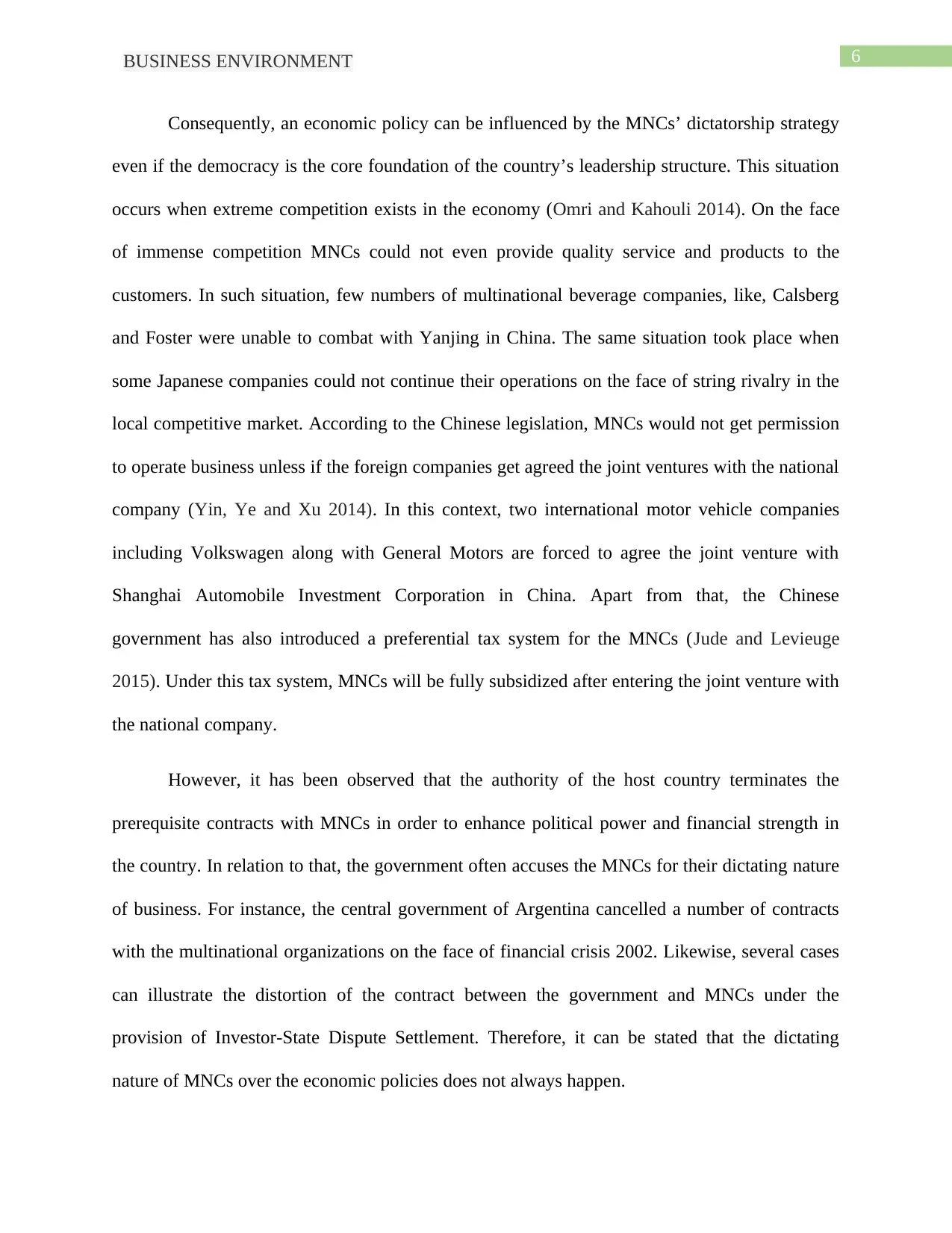
6BUSINESS ENVIRONMENT
Consequently, an economic policy can be influenced by the MNCs’ dictatorship strategy
even if the democracy is the core foundation of the country’s leadership structure. This situation
occurs when extreme competition exists in the economy (Omri and Kahouli 2014). On the face
of immense competition MNCs could not even provide quality service and products to the
customers. In such situation, few numbers of multinational beverage companies, like, Calsberg
and Foster were unable to combat with Yanjing in China. The same situation took place when
some Japanese companies could not continue their operations on the face of string rivalry in the
local competitive market. According to the Chinese legislation, MNCs would not get permission
to operate business unless if the foreign companies get agreed the joint ventures with the national
company (Yin, Ye and Xu 2014). In this context, two international motor vehicle companies
including Volkswagen along with General Motors are forced to agree the joint venture with
Shanghai Automobile Investment Corporation in China. Apart from that, the Chinese
government has also introduced a preferential tax system for the MNCs (Jude and Levieuge
2015). Under this tax system, MNCs will be fully subsidized after entering the joint venture with
the national company.
However, it has been observed that the authority of the host country terminates the
prerequisite contracts with MNCs in order to enhance political power and financial strength in
the country. In relation to that, the government often accuses the MNCs for their dictating nature
of business. For instance, the central government of Argentina cancelled a number of contracts
with the multinational organizations on the face of financial crisis 2002. Likewise, several cases
can illustrate the distortion of the contract between the government and MNCs under the
provision of Investor-State Dispute Settlement. Therefore, it can be stated that the dictating
nature of MNCs over the economic policies does not always happen.
Consequently, an economic policy can be influenced by the MNCs’ dictatorship strategy
even if the democracy is the core foundation of the country’s leadership structure. This situation
occurs when extreme competition exists in the economy (Omri and Kahouli 2014). On the face
of immense competition MNCs could not even provide quality service and products to the
customers. In such situation, few numbers of multinational beverage companies, like, Calsberg
and Foster were unable to combat with Yanjing in China. The same situation took place when
some Japanese companies could not continue their operations on the face of string rivalry in the
local competitive market. According to the Chinese legislation, MNCs would not get permission
to operate business unless if the foreign companies get agreed the joint ventures with the national
company (Yin, Ye and Xu 2014). In this context, two international motor vehicle companies
including Volkswagen along with General Motors are forced to agree the joint venture with
Shanghai Automobile Investment Corporation in China. Apart from that, the Chinese
government has also introduced a preferential tax system for the MNCs (Jude and Levieuge
2015). Under this tax system, MNCs will be fully subsidized after entering the joint venture with
the national company.
However, it has been observed that the authority of the host country terminates the
prerequisite contracts with MNCs in order to enhance political power and financial strength in
the country. In relation to that, the government often accuses the MNCs for their dictating nature
of business. For instance, the central government of Argentina cancelled a number of contracts
with the multinational organizations on the face of financial crisis 2002. Likewise, several cases
can illustrate the distortion of the contract between the government and MNCs under the
provision of Investor-State Dispute Settlement. Therefore, it can be stated that the dictating
nature of MNCs over the economic policies does not always happen.
Paraphrase This Document
Need a fresh take? Get an instant paraphrase of this document with our AI Paraphraser
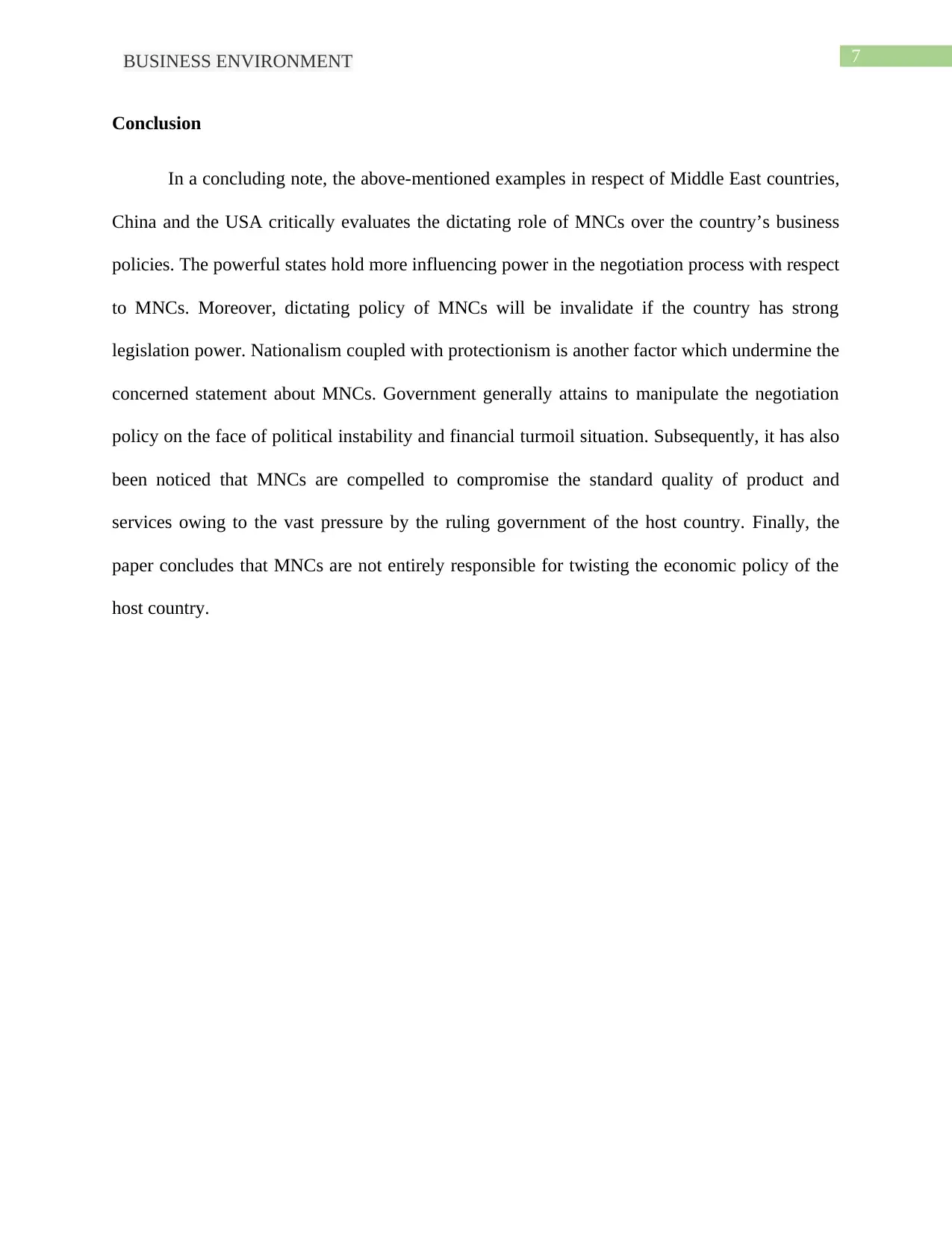
7BUSINESS ENVIRONMENT
Conclusion
In a concluding note, the above-mentioned examples in respect of Middle East countries,
China and the USA critically evaluates the dictating role of MNCs over the country’s business
policies. The powerful states hold more influencing power in the negotiation process with respect
to MNCs. Moreover, dictating policy of MNCs will be invalidate if the country has strong
legislation power. Nationalism coupled with protectionism is another factor which undermine the
concerned statement about MNCs. Government generally attains to manipulate the negotiation
policy on the face of political instability and financial turmoil situation. Subsequently, it has also
been noticed that MNCs are compelled to compromise the standard quality of product and
services owing to the vast pressure by the ruling government of the host country. Finally, the
paper concludes that MNCs are not entirely responsible for twisting the economic policy of the
host country.
Conclusion
In a concluding note, the above-mentioned examples in respect of Middle East countries,
China and the USA critically evaluates the dictating role of MNCs over the country’s business
policies. The powerful states hold more influencing power in the negotiation process with respect
to MNCs. Moreover, dictating policy of MNCs will be invalidate if the country has strong
legislation power. Nationalism coupled with protectionism is another factor which undermine the
concerned statement about MNCs. Government generally attains to manipulate the negotiation
policy on the face of political instability and financial turmoil situation. Subsequently, it has also
been noticed that MNCs are compelled to compromise the standard quality of product and
services owing to the vast pressure by the ruling government of the host country. Finally, the
paper concludes that MNCs are not entirely responsible for twisting the economic policy of the
host country.
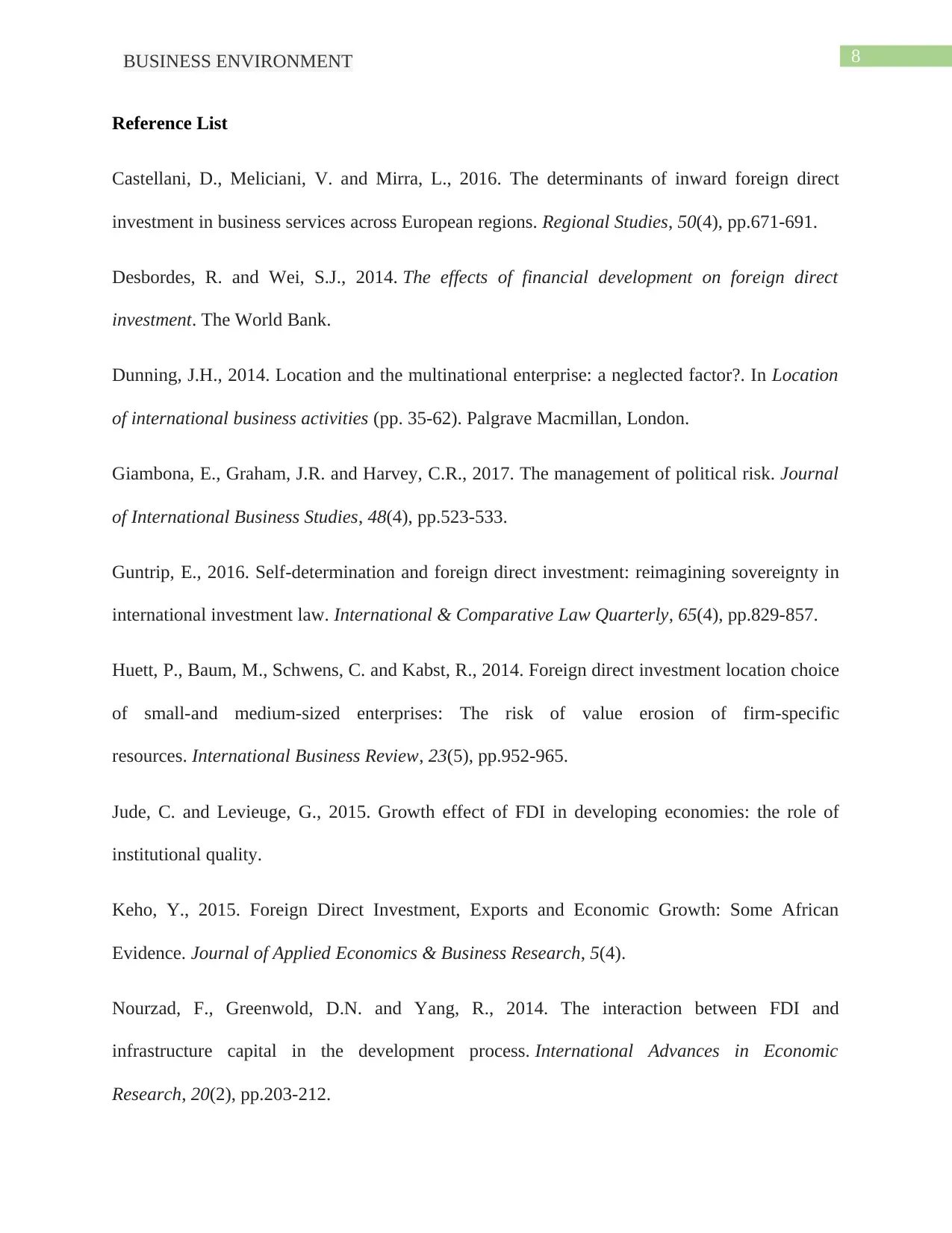
8BUSINESS ENVIRONMENT
Reference List
Castellani, D., Meliciani, V. and Mirra, L., 2016. The determinants of inward foreign direct
investment in business services across European regions. Regional Studies, 50(4), pp.671-691.
Desbordes, R. and Wei, S.J., 2014. The effects of financial development on foreign direct
investment. The World Bank.
Dunning, J.H., 2014. Location and the multinational enterprise: a neglected factor?. In Location
of international business activities (pp. 35-62). Palgrave Macmillan, London.
Giambona, E., Graham, J.R. and Harvey, C.R., 2017. The management of political risk. Journal
of International Business Studies, 48(4), pp.523-533.
Guntrip, E., 2016. Self-determination and foreign direct investment: reimagining sovereignty in
international investment law. International & Comparative Law Quarterly, 65(4), pp.829-857.
Huett, P., Baum, M., Schwens, C. and Kabst, R., 2014. Foreign direct investment location choice
of small-and medium-sized enterprises: The risk of value erosion of firm-specific
resources. International Business Review, 23(5), pp.952-965.
Jude, C. and Levieuge, G., 2015. Growth effect of FDI in developing economies: the role of
institutional quality.
Keho, Y., 2015. Foreign Direct Investment, Exports and Economic Growth: Some African
Evidence. Journal of Applied Economics & Business Research, 5(4).
Nourzad, F., Greenwold, D.N. and Yang, R., 2014. The interaction between FDI and
infrastructure capital in the development process. International Advances in Economic
Research, 20(2), pp.203-212.
Reference List
Castellani, D., Meliciani, V. and Mirra, L., 2016. The determinants of inward foreign direct
investment in business services across European regions. Regional Studies, 50(4), pp.671-691.
Desbordes, R. and Wei, S.J., 2014. The effects of financial development on foreign direct
investment. The World Bank.
Dunning, J.H., 2014. Location and the multinational enterprise: a neglected factor?. In Location
of international business activities (pp. 35-62). Palgrave Macmillan, London.
Giambona, E., Graham, J.R. and Harvey, C.R., 2017. The management of political risk. Journal
of International Business Studies, 48(4), pp.523-533.
Guntrip, E., 2016. Self-determination and foreign direct investment: reimagining sovereignty in
international investment law. International & Comparative Law Quarterly, 65(4), pp.829-857.
Huett, P., Baum, M., Schwens, C. and Kabst, R., 2014. Foreign direct investment location choice
of small-and medium-sized enterprises: The risk of value erosion of firm-specific
resources. International Business Review, 23(5), pp.952-965.
Jude, C. and Levieuge, G., 2015. Growth effect of FDI in developing economies: the role of
institutional quality.
Keho, Y., 2015. Foreign Direct Investment, Exports and Economic Growth: Some African
Evidence. Journal of Applied Economics & Business Research, 5(4).
Nourzad, F., Greenwold, D.N. and Yang, R., 2014. The interaction between FDI and
infrastructure capital in the development process. International Advances in Economic
Research, 20(2), pp.203-212.
⊘ This is a preview!⊘
Do you want full access?
Subscribe today to unlock all pages.

Trusted by 1+ million students worldwide
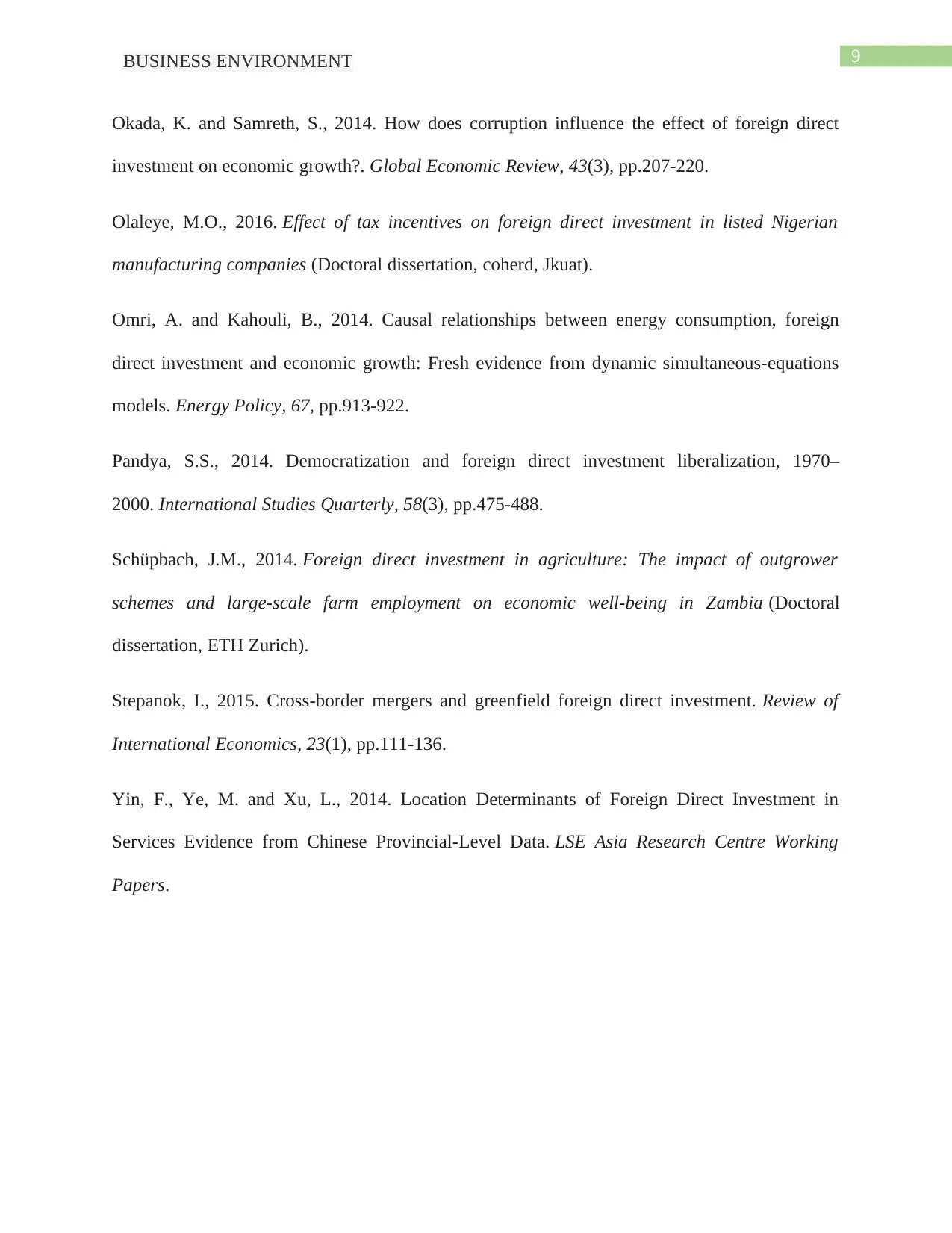
9BUSINESS ENVIRONMENT
Okada, K. and Samreth, S., 2014. How does corruption influence the effect of foreign direct
investment on economic growth?. Global Economic Review, 43(3), pp.207-220.
Olaleye, M.O., 2016. Effect of tax incentives on foreign direct investment in listed Nigerian
manufacturing companies (Doctoral dissertation, coherd, Jkuat).
Omri, A. and Kahouli, B., 2014. Causal relationships between energy consumption, foreign
direct investment and economic growth: Fresh evidence from dynamic simultaneous-equations
models. Energy Policy, 67, pp.913-922.
Pandya, S.S., 2014. Democratization and foreign direct investment liberalization, 1970–
2000. International Studies Quarterly, 58(3), pp.475-488.
Schüpbach, J.M., 2014. Foreign direct investment in agriculture: The impact of outgrower
schemes and large-scale farm employment on economic well-being in Zambia (Doctoral
dissertation, ETH Zurich).
Stepanok, I., 2015. Cross‐border mergers and greenfield foreign direct investment. Review of
International Economics, 23(1), pp.111-136.
Yin, F., Ye, M. and Xu, L., 2014. Location Determinants of Foreign Direct Investment in
Services Evidence from Chinese Provincial-Level Data. LSE Asia Research Centre Working
Papers.
Okada, K. and Samreth, S., 2014. How does corruption influence the effect of foreign direct
investment on economic growth?. Global Economic Review, 43(3), pp.207-220.
Olaleye, M.O., 2016. Effect of tax incentives on foreign direct investment in listed Nigerian
manufacturing companies (Doctoral dissertation, coherd, Jkuat).
Omri, A. and Kahouli, B., 2014. Causal relationships between energy consumption, foreign
direct investment and economic growth: Fresh evidence from dynamic simultaneous-equations
models. Energy Policy, 67, pp.913-922.
Pandya, S.S., 2014. Democratization and foreign direct investment liberalization, 1970–
2000. International Studies Quarterly, 58(3), pp.475-488.
Schüpbach, J.M., 2014. Foreign direct investment in agriculture: The impact of outgrower
schemes and large-scale farm employment on economic well-being in Zambia (Doctoral
dissertation, ETH Zurich).
Stepanok, I., 2015. Cross‐border mergers and greenfield foreign direct investment. Review of
International Economics, 23(1), pp.111-136.
Yin, F., Ye, M. and Xu, L., 2014. Location Determinants of Foreign Direct Investment in
Services Evidence from Chinese Provincial-Level Data. LSE Asia Research Centre Working
Papers.
1 out of 10
Related Documents
Your All-in-One AI-Powered Toolkit for Academic Success.
+13062052269
info@desklib.com
Available 24*7 on WhatsApp / Email
![[object Object]](/_next/static/media/star-bottom.7253800d.svg)
Unlock your academic potential
Copyright © 2020–2026 A2Z Services. All Rights Reserved. Developed and managed by ZUCOL.




